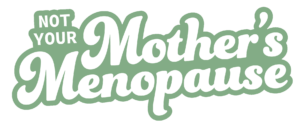If you are entering your 40s, chances are you may be experiencing the early stages of perimenopause. You are not imagining things; something is changing in your body. This change is not a singular event but a sequence of events. Fortunately, these changes are temporary. And if given the right tools these hormone shifts can be less chaotic.
Let us define perimenopause and menopause to help you have a greater understanding of what this means in terms of symptoms and treatment.
What is menopause?
Menopause is signaled by going twelve consecutive months without a menstrual cycle. The average age in the United State is 51 years old. You will start to experience estrogen withdrawal which includes hot flashes, vaginal dryness, and worsening body aches.
What is perimenopause?
At some point in your early forties or even late thirties, you will start to make less progesterone due to infrequent ovulation. To make progesterone, you must ovulate. Think of ovulation as the MVP of your menstrual cycle.
If you have symptoms (we will discuss soon) but are still having periods than you are in perimenopause. Perimenopause can start 5-10 years before menopause, and it is these tumultuous years when women need extra support.
The loss in progesterone can bring a whole list of symptoms such as anxiety, brain fog, insulin resistance, poor sleep, and much more. Coupled with higher-than-normal estrogen. Which further exacerbates symptoms such as breast pain, heavy periods, mood swings, and migraines.
Also, if you have poor detox pathways, or a stressed liver than you have will have difficulty clearing excess estrogen from the body.
There is no blood test for perimenopause it’s a cluster of symptoms:
- Periods are closer together or further apart
- Changes in flow (very heavy with clotting or extremely light until it fades away)
- Night sweats or hot flashes
- Breast pain
- Weight gain without changes in diet or physical activity
- Mood changes
- Brain fog
- Underactive thyroid or sluggish thyroid
- Increased anxiety
- Trouble sleeping
- Thinning hair
- Urinary frequency
- UTIs
- Vaginal dryness
- Low libido
Perimenopause is an inflection point in terms of health and is a window of opportunity to make lifestyle changes. Additionally, there are changes occurring below the surface that you may not notice. Women experience changes in bone, cardiovascular, and brain health. Perimenopause amplifies health issues that may have already been brewing, such as insulin resistance, high stress and/or poor sleep. This is an opportunity for you to make changes in your overall health which will pay off in huge dividends for your future self. Afterall, you could spend a 1/3 of your life post-menopausal and you want those to be healthy years.
What can you do to help perimenopause?
Fortunately, there are strategies to help with this transition. By utilizing a combination of nutrition, lifestyle changes, pharmaceutical options, and supplements these will help reduce the intensity of common symptoms. However, it is essential you start with your foundational health before bringing in supplements and HRT (hormone replacement therapy). You cannot out supplement high stress, poor diet and/or sleep. Foundational health is paramount to your success through perimenopause and beyond.
- Nutrition: Many women enter their forties with years of undereating and over-exercising. This will not serve you during the perimenopause years. We want to focus on replenishing and nourishing the body. Use a food-first approach when mapping out your nutrition plan.
- Prioritize protein, ideally 4-6 oz per meal and spread throughout the day
- Support adrenals and gut health by balancing your minerals and resolving any gut issues
- Consistent and structured meal timing
- Audit your alcohol and caffeine intake
- Bring in mineral dense foods: root vegetables, fruits, coconut water, and dairy (if tolerated)
- Healthy fats: (olive oil, fatty fish, nuts/seeds) to reduce inflammation
- Bring in cruciferous vegetables (kale, broccoli, Brussel sprouts etc.) and bitter foods (radishes, arugula, bitter tonics etc.) to help metabolize estrogen
- Ensure regular bowel movements to help with elimination of estrogen
- Avoid undereating, trendy diets, and restrictive cleanses
- Stop focusing on “clean” eating and doing everything “right”
The “right” diet is one that balances your blood sugar, supports your hormones, nourishes your body, is low in ultra processed foods/sugar and is anti-inflammatory for you.
- Nervous system support: stress management becomes crucial in this time of your life. This can come in many forms such as stimulating the vagus nerve through yoga, meditation, and/or deep breathing. Focus on spending more time outside, building social connections, and setting firm boundaries. Now is the time of your life to do what you can to reduce your stress burden and stave off mood disorders in the future.
- Circadian rhythm support: Sleep is elusive during perimenopause due to the drop in progesterone. So, let’s do what we can to support it. Focus on starting your day with sunlight, think a short walk within the first hour of waking. In the winter months you can use a light box to mimic blue-wavelength light. Nutrition can also be an important to help with sleep. Add in complex carbs with dinner to help counteract blood sugar dips in the middle of the night that could be contributing to sleep disturbances.
In the evening, turn screens off 2 hours before bedtime or dim your screen. Reduce or eliminate alcohol and no caffeine past 12PM. Alcohol impairs melatonin production and can disrupt your sleep cycle. We want to avoid the dreaded 3AM awakenings.
- Smart movement: The hours of endless cardio stop here. Period. As we age, we begin to lose lean muscle mass and to counteract this loss start incorporating lifting heavy weights 2-3 times per week and getting regular restorative movement such as walking. Lean muscle mass will improve blood sugar, metabolic health, bone density, prevent injuries and help improve body composition.
- Rebalance your minerals: Minerals are spark plugs for the cells. They help with so many processes in the body including digestion, energy, hormone balance, and thyroid support. Start with simple adrenal or mineral cocktails.
- Supplements: There are supplements that can help with perimenopause symptoms. Such as, magnesium, taurine, B vitamins, and Black Cohosh. Adaptogen teas such as Tulsi (Holy Basil) or Ashwagandha can help with soothing the nervous system. Supplements are powerful tools and can interact with other medications. As always check with your physician, dietitian and/or pharmacist before adding in supplements.
- Hormone Replacement Therapy (HRT): If you have worked on your foundational health and are still experiencing symptoms it may be time to bring in HRT to help restore estrogen, progesterone, and testosterone. Start having these conversations early with your doctor to discuss your options. Most importantly, work with a qualified practitioner who is well-versed in HRT. If your physician is not comfortable or is dismissive of your questions/symptoms, it is time to find a new one.
Troubleshooting common perimenopause symptoms
Weight gain:
In our practice, women report weight gain as one of their most frustrating symptoms. Weight gain occurs without changes in diet or physical activity and is due to the decline in progesterone and fluctuations in estrogen. These can cause a sluggish thyroid, a spike in your cortisol and increase in insulin resistance. Body fat tends to accumulate around the middle or in places you never had body fat before. It is important to understand your body will change and to shift your focus to improving body composition. In our practice we do not use the scale as a metric of success but rather focus on increasing lean muscle mass while decreasing body fat percentage.
Expert recommendations:
- As mentioned above, lifting weights is going to be your best tool to combat the increase in body fat. Aim for 2-3 X weekly.
- Do cardio but not too much. We want the Goldilocks amount. Move your body throughout the day. Try to avoid sitting longer than 2 hrs. Set an alarm to remind yourself. Save the HIIT classes for when you have replenished your adrenals, are sleeping well, and eating enough.
- Treating insulin resistance by balancing your blood sugars and making sure your plate includes protein, healthy fats, and fibrous carbs.
- Prioritize protein: aim for 4-6 oz at every meal
- Resolve digestive issues and support the microbiome
- Avoid restrictive eating patterns. Most diet plans do not consider the hormone fluctuations that are occurring in perimenopause and can only leave you feeling deprived and frustrated.
Hot flashes:
These can come on seemingly out of nowhere. They can be a flush or full-blown body sweat.
Expert recommendations:
- Employ the basics: nutrition, sleep strategies and cooling the nervous system
- Avoid your triggers such as alcohol, caffeine and/or chocolate
- Balance blood sugars and avoid insulin resistance
- Discuss with your provider taking magnesium and taurine
- Consider taking progesterone or in combination with estrogen
Mood changes and fatigue:
With the fluctuations in hormones, it can bring about feelings of depression, rage, irritability, anxiety, being overwhelmed and low energy.
Expert recommendations:
- Make sleep a top priority
- Set healthy boundaries. “No” is a complete sentence.
- Soothe the nervous system
- Make sure you are eating regularly (every 3-4 hours) and balancing your blood sugars
- Work with a therapist
- Give yourself some grace; this is a challenging time of your life
- Discuss with your provider starting HRT
Brain Fog:
Are you forgetting things or don’t feel as sharp? You are not alone. Your brain is undergoing a major recalibration and is trying to adapt to the fluctuating levels of progesterone and estrogen.
Expert recommendations:
- Treat insulin resistance and balance your blood sugars
- Discuss with your provider supplements such as magnesium, taurine and/or B vitamins
- Prioritize sleep
- Nervous system support
- Reduce or eliminate alcohol
- Build lean muscle mass
Heavy Periods or Prolonged Bleeding:
Without adequate amount of progesterone to tame down the proliferative effects of estrogen, you can experience a build up of the uterine lining which can contribute to very heavy bleeding or even clotting.
Expert recommendations:
- Focus on metabolizing your estrogen through liver and gallbladder support. Ensure regular elimination through bowel movements.
- Bring in bitter foods: radishes, arugula, dandelion greens, citrus/citrus rinds, alfalfa sprouts, beet greens and bitter tonics
- Resolve constipation. In our practice we use a combination of food, employ relaxation techniques and referral to a pelvic floor therapist
- If you are experiencing heavy bleeding, you cannot go this alone and for too long. Speak to your doctor to rule out fibroids, endometriosis, and other conditions. Treatment can be a combination of nutrition, hormonal birth control, HRT and/or surgery.
What about surgical or chemical menopause?
This refers to women who have had their ovaries removed or are taking medication that induce menopause. Symptoms can be sudden and extreme. Work with a qualified practitioner that can help you navigate these challenges. Typically, it is a combination of HRT, supplements, nutrition, and foundational health.
Build Your Team
While there are generalizations when it comes to (peri)menopause care, not all women will have the same experience and respond to the same treatment. It requires personalized interventions. It is important to collaborate with qualified practitioners who are well versed in perimenopausal care. This is massive hormonal shift that requires a special lens in terms of treatment. Do not be afraid to advocate for yourself. If you do not feel supported with your current doctor or team, find a new one.
“This too, shall pass.”
Keep in mind there will be a time, when you have steadier mood, better sleep, periods are gone, and your weight has stabilized. This is a time to celebrate and embrace who you are. Women report feeling more confident and empowered. Congratulations you have made it to the other side!


